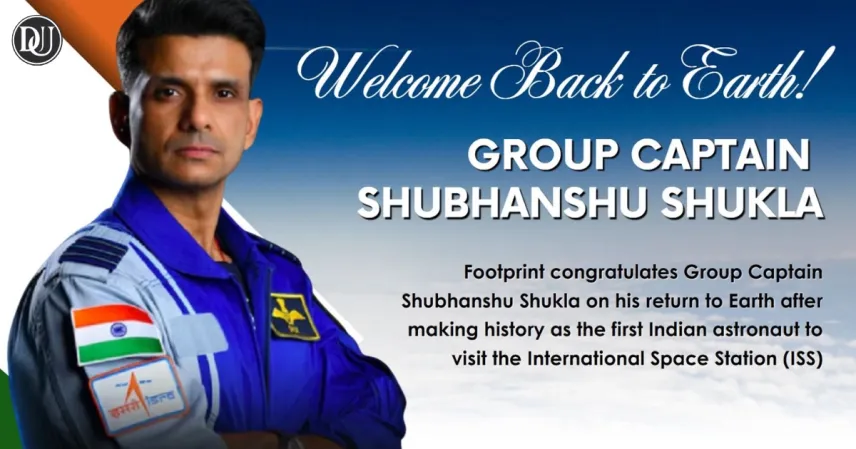Shubhanshu Shukla is back on Earth — just heard about it, and honestly, it’s wild to think someone just came back from the International Space Station, you know? Like, one minute you’re floating weightless, looking down at our big blue marble, and the next you’re going through a fiery re-entry, then dealing with gravity again. That’s got to be the ultimate jet lag. According to the BBC, he’s the first Indian astronaut to go to the ISS, which is a massive deal, I think. It’s not just a visit, he was actually part of the crew, working up there. Makes you really appreciate how far we’ve come in space exploration, doesn't it?
✨ A Return to Gravity: The First Indian ISS Journey Concludes
Imagine the sensory overload. From the silence of space, apart from the hum of the station, to the sounds and feelings of Earth. Apparently, the descent module splashes down or lands somewhere remote, and then they're slowly extracted. It’s not like stepping off a plane, obviously. People often don't consider the re-adaptation period, but it's crucial. Your body totally changes in microgravity – bones, muscles, even your fluids redistribute. So, coming back is a whole journey in itself, beyond just the physical trip. It's a huge moment for him personally, and, you know, for the country.
🇮🇳 A Giant Leap for India: National Pride in Orbit
This is honestly such a proud moment for India. We’ve had cosmonauts who flew with Soviet missions before, but having an Indian astronaut, Shubhanshu Shukla, as part of the ISS crew, actively contributing… it really elevates India's standing in the global space community. It's not just about national pride, though that’s huge. It’s about scientific collaboration, about showing technological capability, and about inspiring a whole new generation back home to look up at the stars and dream. You can’t put a price on that kind of inspiration, can you? It pushes boundaries, makes young people think about what’s possible.
🔭 Life Above: What Happens on the ISS?
I always wonder what their day-to-day is like up there. It’s not just floating around and looking out the window, as cool as that sounds. They’re running experiments constantly – on human physiology, material science, biology, new technologies for future missions. Probably something super intricate and complex that I wouldn't even begin to understand, like how certain proteins behave without gravity or the best way to recycle water in a closed loop system. Every bit of data they collect, every observation, helps us understand more about living in space for longer periods, which is vital if we’re ever going to Mars or beyond. It’s basically a flying research lab.
🔄 The Re-entry: A Fiery Welcome Home
The journey back home must be terrifying and exhilarating all at once. Think about it – hitting the Earth’s atmosphere at thousands of miles per hour. That capsule gets super hot, protected by a heat shield, turning into a literal fireball in the sky. Then the parachutes deploy, slowing it down drastically before a soft landing, or well, relatively soft. I’ve seen videos, and it’s always intense. The G-forces they pull during deceleration… it’s insane what the human body can endure. And then the silence when they finally land, just the sound of the wind, probably. Must be an incredible relief.
🚀 India's Future in Space: Beyond the ISS
Shukla’s return, and his mission, feels like a huge stepping stone for India's own human spaceflight program, Gaganyaan. They’ve been working on it for a while, and getting firsthand experience from an astronaut on the ISS, learning about long-duration missions, about crew operations, emergency protocols… that insight is invaluable. It’s not just theoretical anymore. This makes Gaganyaan feel so much more real, you know? It's like, okay, we've done this, we've sent someone, we've brought them back safely, now we can build on that. Maybe it fast-tracks their own crewed missions. I'm not 100% sure on the exact timeline, but it just feels like things are moving faster.
💡 Beyond the Science: The Human Element of Space Travel
It’s easy to get caught up in the technology and the scientific breakthroughs, which are obviously phenomenal. But there’s also the sheer human endurance and spirit involved. The years of training, the isolation, the risk… it takes a special kind of person. They live in incredibly cramped quarters, they have to maintain strict schedules, and every single thing they do is vital. The mental resilience required – that's something I often think about. And then coming back, adjusting to normal life. Like, does food taste different? Do they appreciate mundane things more? It's fascinating. These missions, they truly embody the peak of human ingenuity and courage. It just makes you wonder what else is out there, and what else we can achieve.










